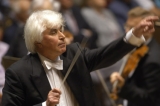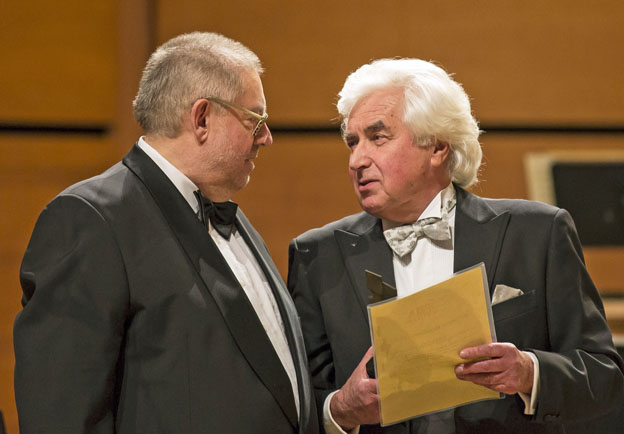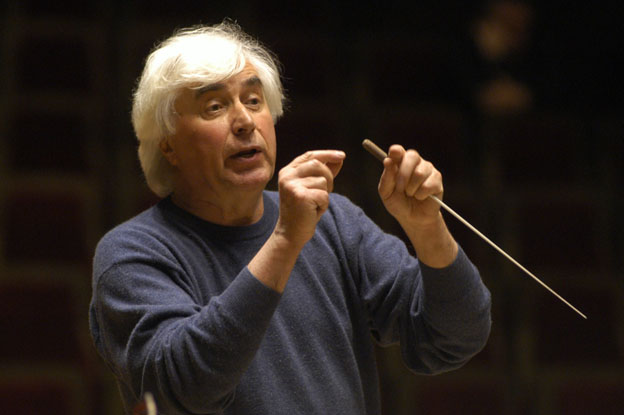Maestro, have you been born into a musical family?
Not at all! My mother was a teacher and my father an engineer. However our house was next to the choir school of the St.Petersburg Boys Choir. Since my mother had noticed that I could sing and that I successfully tried to get some music out of our piano – it was kind of a toy for me at that time, just after the war, when real toys were not available – she let me take part in a competition. We were over hundred boys applying for 10 places at that music school, and I successfully won one of the places. So, as from my childhood on, I studied singing, violin, piano, percussion and even composition.
And how did it come that you finally became a conductor?
From the beginning I considered that it was important to me not only to play myself – which I found rather boring, I must confess. I wanted to communicate with other people, I wanted to hear how my musical ideas were developed by other musicians. I was still very young when I started working as a choir director. And then some people would tell me: That’s your business, you never should try symphonic repertoire or opera. Yet, my professor said the contrary. So I started studying orchestra direction and opera at the Conservatory in St. Petersburg and later in Moscow with Leo Ginzburg, who had been an assistant to Otto Klemperer. With him I studied the whole classical repertoire. Then I was lucky to be part of an exchange program between Austria and the Soviet Union, and I settled in Vienna where I studied with Karl Österreicher and Hans Swarowsky.
Did you, as a child, get the opportunity to hear classical music in concerts?
Not only could I listen to music, I participated regularly in concerts. Our children’s choir was as good as the Wiener Sängerknaben or the Thomanerchor, and four or five times a year we sang with the Leningrad Philharmonic under Yevgeny Mravinsky. I will always remember our performance of Shostakovich’s oratorio Song of the Forests, with the composer being present at the rehearsals as well as at the concerts. The fact that we continuously participated in concerts gave us a natural feeling for being on stage. I never had any fear when walking on stage!
You never played any instrument in public?
Yes, I did! I gave piano recitals and I even performed Edward Grieg’s Piano Concerto with orchestra. I always was better at the piano then at the violin, though I know enough from that instrument for being able to tell the string section in an orchestra about my intentions.
How long did you stay in Vienna?
For one year! Then I went back to Russia. In 1969, Karajan went with the Berlin Philharmonic to St. Petersburg and he gave a masterclass which I was able to attend. Karajan asked the Minister of Culture to send two participants of that masterclass to his first Conducting Competition in Berlin. I was one of the two. So I took part in the competition and won Second Prize. My career developed quite fast after this success, and I was appointed principal conductor of the Stanislavsky Opera Theatre in Moscow at the age of twenty-nine. In 1976 I as named Music Director of the Moscow Philharmonic. That was quite a job: we not only played the concerts in Moscow, but we traveled a lot, we made TV productions and a larger number of recordings.
Today you are recognized especially as a conductor of Russian music. I assume that in Moscow you conducted a lot of other repertoire.
Exactly! For the Moscow Philharmonic the Russian music was essentially a touring repertoire. Our audience in Moscow loved to hear the great works by Haydn, Mozart, Beethoven …I conducted the complete symphonic works by Richard Strauss and also the Russian premiere of Mahler’s Eights Symphony. We recorded mostly works by German, French or Italian composers… But today, the orchestras will ask me first of all for the Russian repertoire. They want an authentic interpreter of that music. And I must say that a large part of the Russian repertoire – just think of Rachmaninov’s The Bells, even his First Symphony, Prokofiev’s Ivan the Terrible, the Scriabin symphonies.. .- is still not well known in Europe. And, after all, this might well be kind of a mission for me to conduct this music and make it more popular.
Did you work with conductors like Mravinsky or Kondrachine…?
After the Karajan competition I conducted the Leningrad Philharmonic several times and I spoke with Mravinsky. However that relation went not far. I had more contact with Rozhdestvensky and especially with Yevgeny Svetlanov. He was a great musician and I learned a lot from him. He never spoke very much during rehearsals, he told the orchestra musicians everything with his magic hands and his heart.
But Mravinsky was the one who revolutionized the Tchaikovsky interpretation?
Tchaikovsky music suffered and still suffers in Europe and even in Russia from too much sentimentality, excessive rubato and ritardando, from being too loud and too strong. In fact, a conductor can make many wrong decisions and turn Tchaikovsky into a jam, something sweet and whiny. Mravinsky ran the vacuum and took very stable tempi. The result brought a tremendous clarity of structure and phrasing. My own approach of Tchaikovsky is the same like I deal with the Vienna classicism. Rachmaninov is much more Russian like Tchaikovsky. When I see, how young conductors ad their own views to Tchaikovsky’s music I would like to tell them: It’s too early for you to conduct Tchaikovsky. Wait for some years! In fact it’s easier to conduct Mahler then Tchaikovsky. Mahler tolerates more different views and ways. As a Tchaikovsky performer you wear kind of a corset, just like when you perform Beethoven and Mozart.
It looks like you don’t trust young conductors.
Some of them are very suspect to me, indeed! I can see that many young conductors use the orchestra in a primarily virtuosic way: the music has to be loud and energetic. Unfortunately, the audience loves that. Part of the audience follows a concert not so much with the ears but with the eyes. They like it when a conductor is dancing on the podium and when he shows energy. Yet, energy does not necessarily mean intensity.
The main problem for young conductors is that they do not take enough time to study. Obviously, every young conductor is able to conduct the Second Brahms with the Berlin Philharmonic. He can do it without knowing the work in depth. He probably spends some time in listening to CDs and uses the mirror for a maximum of visual effect, but he is not an interpreter. He is a miserable copy, a mix from Furtwängler, Celibidache and Svetlanov. Such a conductor is very mobile, but empty in his heart. And cold in his brain.
Did you never think of teaching?
I was a professor at the Moscow Conservatory for some ten years. Today, I am ready to answer questions from young conductors whenever they like to ask for, but I cannot imagine myself becoming a teacher, I do not have enough patience. When I would ask a student to write down – by memory – a certain passage from a score and he would not be able to do it, I simply would not continue working with him.
So, according to what you say, even if one uses a score, the content of the music must entirely be in one’s head.
Karajan never used a score, but he read the score in his head. I also conducted concerts without a score, but I think that the orchestra likes to see a conductor having the score in front of him. It inspires confidence to the musicians.
Currently you are not in the position of a Music Director. You are Artistic Adviser of the Zagreb Philharmonic, you are Conductor Laureate of the Gürzenich Orchestra and First Guest Conductor of the Konzerthausorchester in Berlin. Would you not like to become Music Director once more?
It is my very personal opinion that today, an orchestra does not need to have a Music director, unless it expects him to deal with sponsors or politicians. From a purely musical point of view the orchestra better has to engage four or five principal conductors, each one specializing in the repertoire in which he excels. Such conductors should be of different ages and come from different countries, to guarantee a maximum of input. All too often, I have noticed that orchestra musicians are not really happy with their Music Director, and nevertheless, since he has a contract, they are obliged to work with him. That’s not a good basis for music making. Times have changed. We are no longer in a situation where an orchestra should have a lifelong engagement with a conductor, like it used to happen in the 20th century, when we spoke of a Svetlanov Orchestra, a Karajan Orchestra or an Ormandy Orchestra… Today, the musical world moves too fast and we need more changes, we need a broader repertoire, we need different ways of music making. Honestly, I cannot think of one single name, when I would be asked to propose a Music Director for one of the bigger orchestras.
Did you have any exchange of views with other conductors on that topic?
No! One of the major problems is that conductors do not share ideas and thoughts about our métier. Doctors, engineers and lawyers have international associations where they discuss the situation of their profession. Conductors do not have any common institution. We do not protect our profession. We accept that every pianist or violinist, any tuba player or percussionist becomes a conductor like if no professional training was required.
You receive this year the ICMA Lifetime Achievement Award. Time to look back? What was the most important aspect of your career?
What means most to me is that I was able to perform the most important works by Tchaikovsky, Rachmaninov, Scriabin, Prokofiev, and to do it in depth. I mostly enjoy rehearsals more than concerts. I enjoy putting things together, I enjoy forming the music. The most important event in my life was the Karajan Competition in Berlin. That was the moment when I felt that I was ready to do the job, to start a career and to develop it.
Karajan himself also meant a lot to me. After I won his Award, he told his winners: You are my children now. Whenever you have any question, just get in touch with me. But above all he was a model for me, a model when it came to work hard, to never abandon the search for something new and to continuously work on shaping the sound. He had his own sound, the Karajan sound, be it with the Berlin or the Vienna Philharmonic, he always had his personal sound. That was fascinating for me and I tried to penetrate that mystery, without success…
But you also have your own sound, the Kitajenko sound. Is that also a mystery?
It is. I do not really know where it comes from. Of course, I know about the ingredients, I know what I expect in such and such work. But at the end, yes, there is always part of a mystery.
You have now conducted for a very long time. Are there still works you have not done and you would like to conduct?
I think I know better what I will no longer conduct. Liszt for example. Liszt is moving away from me. I also avoid Mahler. On the other hand, I would like to do again some Bruckner. I would very much like to do the Fifth and the Eights Symphonies…

























